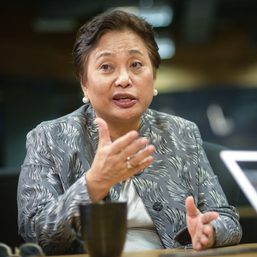SUMMARY
This is AI generated summarization, which may have errors. For context, always refer to the full article.
MANILA, Philippines – If the current rules for partylist groups would be strictly implemented, almost a third of those who participated in the 2010 elections would not be allowed to join the 2013 polls.
This includes disqualifying 17 partylist groups that are currently represented in the House of Representatives.
Under Republic Act 7941 or the Party-list System Act, the election body can cancel the accreditation of a partylist group if it “fails to participate or obtain at least 2% of the votes cast under the party-list system in the 2 preceding elections.”
The Commission on Elections (Comelec) even reiterated this rule when it released Resolution 9366, which sets the guidelines for partylist participation in the 2013 elections, in February.
Out of the 186 partylist groups that participated in the 2010 national election, 52 of them obtained a vote of less than 2% in both the 2007 and 2010 polls, thus disqualifying them for the 2013 elections according to the rule.
Among these are the following partylist groups that each won a seat in the last national elections and are now serving a term in Congress:
- Akong Ako Kasosyo Party (AA KASOSYO)
- 1-United Transport Coalition (1-UTAK)
- Aangat Tayo (AANGAT TAYO)
- Agbiag Timpuyog Ilocano (AGBIAG)
- Alliance for Nationalism and Democracy (ANAD)
- Alliance for Volunteer Educators (AVE)
- Alyansa ng mga Grupong Haligi ng Aggam at Teknolohiya Para sa Mamamayan (AGHAM)
- Ang Galing Pinoy (AGP)
- Ang Laban ng Indiginong Filipino (ALIF)
- Arts Business and Science Professional (ABS)
- Democratic Independent Workers Association (DIWA)
- Kabataan (KABATAAN)
- Kapatiran ng mga Nakulong na Walang Sala (KAKUSA)
- Kasangga sa Kaunlaran (ANG KASANGGA)
- Pwersa ng Bayaning Atleta (PBA)
- Trade Union Congress Party (TUCP)
- You Against Corruption and Poverty (YACAP)
Out of these 17 groups, 10 also won a seat in the 2007 national polls despite obtaining less than 2% of votes.
To give credit to Comelec, the rule has been faithfully enforced. The poll body has delisted 25 partylist groups in the registration for the 2010 elections for having failed to meet the 2% vote requirement, and removed 34 party-list groups in the registration for the 2007 polls for the same reason.
But things have changed in the 2010 elections, when the Supreme Court decided to change the computation as to how many congressional seats a partylist group can obtain.
The high court declared in 2009 that the 2% threshold in the distribution of seats for partylist groups is unconstitutional, as it “presents an unwarranted obstacle in the attainment of the permissive ceiling of 20% of the members of the House of Representatives that should comprise the total number of party-list representatives as mandated by the Constitution.”
Because of this, Comelec allowed those partylist groups which had already been allocated seats in 2007 but failed to get 2% votes in the 2004 and 2007 elections to join the 2010 race.
Upcoming 2013 polls
So will this exemption be applied as well for the 2013 elections?
For former Comelec Law department and now Planning department head Ferdinand Rafanan, the 17 partylist groups should still be allowed to join the 2013 race. He explained in a phone interview that the exemption granted by the decision of the Supreme Court should already be applied to subsequent elections.
“Meron nang decision ang Supreme Court, pero hindi pa rin na-a-adjust ang rule. Dapat baguhin na nila yan (The Supreme Court has already issued a decision but they haven’t adjusted their rules. They should change their rules),” he explained.
But for the current Comelec law department head Esmeralda Amora-Ladra, the 2% threshold is exclusively for congressional seat allocation. She explained in another phone interview that this doesn’t cover the qualifications for admitting partylist groups for the elections.
“It’s in Resolution 9366. It has to be followed. Pag hindi ito na-meet (if this is not met), it’s a ground for cancellation of a partylist group,” she said.
Earlier registration deadline
Whatever the fate of these partylist groups is will lie on the hands of the Comelec en ban. After all, Comelec officials are already expecting to deal with more discussions and petitions for partylist group participation in the 2013 polls.
This is the reason why the poll body has pushed its deadline for partylist group participation earlier compared to previous years, according to Comelec commissioner Rene Sarmiento.
Registration for partylist accreditation for next year’s election was set on March 31–more than a year before the 2013 polls.
Sarmiento told Rappler that they are already anticipating a lot of petitions to arise–whether these petitions seek for the inclusion of a rejected group, or for the disqualification of an accredited group.
“Even the partylist groups are clashing,” Sarmiento said in Filipiino. “That’s why we’re conducting the registration early since we expect a lot of groups to file for petition.
In the 2010 elections, the deadline for registration of partylist group participation was set on August 17 — only 4 months before the filing of certificates of candidacy (COCs), and 8 months before the May 10 polls.
Late changes in the line-up of partylist groups due to petitions caused inconveniences in the polls, among them the delaying of printing of ballots and the change in the length of ballot papers. – Rappler.com
Add a comment
How does this make you feel?
![[OPINION] Sara Duterte: Will she do a Binay or a Robredo?](https://www.rappler.com/tachyon/2024/03/tl-sara-duterte-will-do-binay-or-robredo-March-15-2024.jpg?resize=257%2C257&crop_strategy=attention)
![[New School] Tama na kayo](https://www.rappler.com/tachyon/2024/02/new-school-tama-na-kayo-feb-6-2024.jpg?resize=257%2C257&crop=290px%2C0px%2C720px%2C720px)




![[The Slingshot] Alden Delvo’s birthday](https://www.rappler.com/tachyon/2024/04/tl-alden-delvo-birthday.jpg?resize=257%2C257&crop=263px%2C0px%2C720px%2C720px)
![[EDITORIAL] Ang low-intensity warfare ni Marcos kung saan attack dog na ang First Lady](https://www.rappler.com/tachyon/2024/04/animated-liza-marcos-sara-duterte-feud-carousel.jpg?resize=257%2C257&crop=294px%2C0px%2C720px%2C720px)
![[Newsstand] Duterte vs Marcos: A rift impossible to bridge, a wound impossible to heal](https://www.rappler.com/tachyon/2024/04/duterte-marcos-rift-apr-20-2024.jpg?resize=257%2C257&crop=278px%2C0px%2C720px%2C720px)

There are no comments yet. Add your comment to start the conversation.